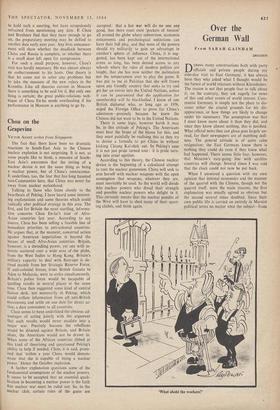Chou on the Grapevine
VICTOR ANANT writes from Singapore: The fact that there have been no dramatic reactions in South-East Asia to the Chinese nuclear explosion is not surprising. It is not, as some people like to think, a measure of South- East Asia's awareness that the testing of a nuclear device is not the same thing as being a nuclear power, but of China's omniscience. It underlines, too, the fear that has long haunted non-Communists here, that China was never far away from nuclear nationhood.
Talking to those who listen closely to the heartbeats of Peking, I have heard some interest- ing explanations and some theories which could radically alter political strategy in this area. The first, and for Britain the most startling, informa- tion concerns Chou En-lai's tour of Afro- Asian countries last year. According to my source, Chou has been selling a feasible line of immediate priorities to anti-colonial countries. He argues that, at the moment, concerted action against American imperialism is beyond the means of small Afro-Asian countries. Britain, however, is a dwindling power, yet one with in- terests scattered over a wide area of .the globe, from the West Indies to Hong Kong. Britain's military capacity to deal with flare-ups is de- rived mainly from her Strategic Reserve Force. If anti-colonial forces, from British Guiana to Aden to Malaysia, were to strike simultaneously, Britain's police force would be incapable of quelling revolts in several places at the same firne. Chou then suggested some kind of central liaison desk, not necessarily in Peking, which could collate information from all anti-British movements and settle on one date for direct ac- tion, a date convenient to all countries.
Chou seems to have underlined the obvious ad- vantages of acting jointly with the argument that such revolts would never escalate into a major war. Precisely because the rebellions would be directed against Britain, and Britain alone, the Americans would not be drawn in. .When some of the African countries jibbed at this kind of theorising and questioned Peking's ability to help if needed, Chou, it is said, prom- ised that 'within a year China would demon- strate that she is capable of being a nuclear Power.' Hence the October explosion.
A further explanation questions some of the fundamental assumptions of the nuclear powers. It seems to be accepted that an essential quali- fication in becoming a nuclear power is the faith that nuclear war must be ruled out. So, in the nuclear club, certain rules of the game are accepted : that a hot war will do no one any good, that there must exist 'pockets of tension' all around the globe where subversion, economic enticements and psychological seductions can have their full play, and that none of the powers should try militarily to gain an advantage in another's sphere of influence. China, it is sug- gested, has been kept out of the international arena so long, has been denied access to any schools where the rules of modern politics are taught, that she has now neither the inclination
nor the temperament ever to play the game. It•was put to me in Pakistan that she will frown upon any friendly country that seeks to try and get her an entrée into the United Nations, unless it can be guaranteed that the application for membership will be blackballed. I know of one British diplomat who, as long ago as 1956, urged the Foreign Office to press for China's admission—precisely because he knew the Chinese did not want to be in the United Nations.
There is some logic, however harsh it may be, in this attitude of Peking's. The Americans must bear the brunt of the blame for this, and they must painfully be realising this as they try to devise a formula to get China in without kicking Chiang Kai-shek out. In Peking's case it is not just pride turned sour : it is pride turn- ing into cruel egotism.
According to this theory, the Chinese nuclear device is the beginning of a calculated attempt to rout the nuclear gamesmen. China will seek to arm herself with nuclear weapons with the open assumption that weapons, whatever they are, must inevitably be used. So the world will divide into nuclear powers who dread their strength and possible nuclear powers who delight in it. This certainly means that the nuclear pundits of the West will have to shed many of their, sport- ing cliches, and think again.










































 Previous page
Previous page